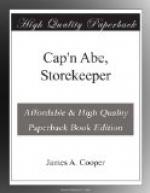Louise saw that Lawford was foremost among the volunteers. The lifeboat crew, their belts strapped under their arms, had taken their places in the boat. Captain Trainor stood in the stern with his steering oar. On its truck the lifeboat was run into the surf.
“Now!” shrieked the excited moving picture director. “Action! Camera! Go!”
There was something unreal about it—it was like a play. And yet out there on that schooner her crew faced bitter death, while the men of the Coast Patrol took their lives in their hands as the lifeboat was run through the bursting surf.
The volunteers ran in till those ahead were neck deep in the sea. Then the boat floated clear and, with a mighty shove from behind the surfmen pulled out.
Lawford and his mates staggered back with the gear. The lifeboat lifted to meet the onrolling breakers. The men tugged at the oars.
Somebody screamed. Those ashore saw the white gash of a split oar. The man in the bow went overboard, not being strapped to the seat. His mate reached for him and the banging broken oar handle hit him on the head.
The boat swung broadside and the next instant was rolling over and over in the surf, the crew half smothered.
The spectators ran together in a crowd. But Lawford and some of the men who had helped to launch the boat rushed into the surf and dragged the overturned craft and her crew out upon the beach.
“One of the crew with a broken arm; another knocked out complete with that crack on the head,” sputtered Cap’n Jim Trainor. “Two of my very best men. Come on, boys! Who’ll take their places?”
Lawford was already putting on the belt he had unbuckled from about one of the injured surfmen. The Taffy King, seeing what his son was about, shouted:
“Ford! Ford! Don’t dare do that! I forbid you!”
Lawford turned a grim face upon his father. “I earn eighteen a week, dad. I am my own boss.”
A soft palm was placed upon I. Tapp’s lips before he could reply. Louise was weeping frankly, but she urged:
“Don’t stop him, Mr. Tapp. Don’t say another word to him. My—my heart is breaking; but I am glad—oh, I am so glad!—that he is a real man.”
Cap’n Trainor’s hard gaze swept the circle of strained faces about him. After all, the men here were mostly “second raters”—weaklings like Milt Baker and Amiel Perdue, or cripples like Cap’n Joab and Washy Gallup.
Suddenly the captain’s gaze descried a figure well back in the crowd—one who had not pushed forward during these exciting moments, but who had been chained to the spot by the fascination of what was happening.
“Ain’t that Cap’n Am’zon Silt back there?” demanded the skipper of the lifeboat crew. “You pull a strong oar, I know, Cap’n Am’zon. We need you.”




